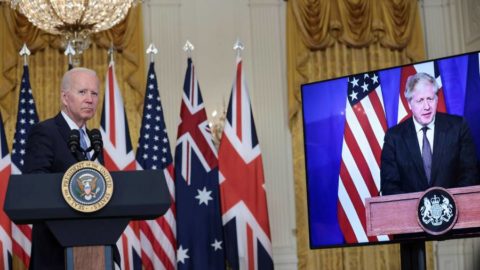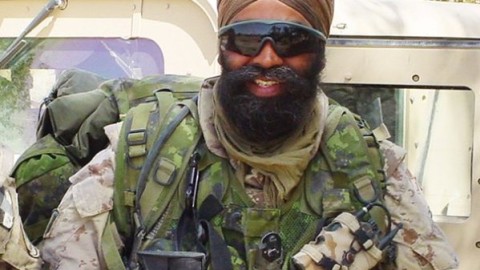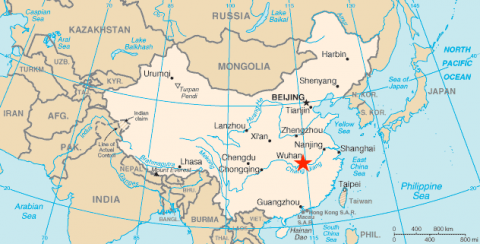The History Guy: History Deserves to Be Remembered
Published 22 Sep 2021On January 13, 1842, a single man on horseback approached the British garrison at Jalalabad, where soldiers were waiting for a retreating army of several thousand. Exhausted, the man had part of his skull shaved off by a sword and his horse was so exhausted that it would soon perish. As he was brought into the walls of the city the lone man was asked where the rest of the army was. “I am the army,” he replied. Thus ended a disastrous retreat from Kabul, where a British force of some 4,500 soldiers and thousands of civilians was almost entirely destroyed.
This is original content based on research by The History Guy. Images in the Public Domain are carefully selected and provide illustration. As very few images of the actual event are available in the Public Domain, images of similar objects and events are used for illustration.
You can purchase the bow tie worn in this episode at The Tie Bar:
https://www.thetiebar.com/?utm_campai…All events are portrayed in historical context and for educational purposes. No images or content are primarily intended to shock and disgust. Those who do not learn from history are doomed to repeat it. Non censuram.
Find The History Guy at:
Patreon: https://www.patreon.com/TheHistoryGuy
Please send suggestions for future episodes: Suggestions@TheHistoryGuy.netThe History Guy: History Deserves to Be Remembered is the place to find short snippets of forgotten history from five to fifteen minutes long. If you like history too, this is the channel for you.
Awesome The History Guy merchandise is available at:
https://teespring.com/stores/the-hist…Script by JCG
#history #thehistoryguy #Afghanistan
January 22, 2022
1842 Retreat From Kabul
November 25, 2021
Why The Most Expensive US Martial Pistol Exploded A Lot
Forgotten Weapons
Published 12 Aug 2021http://www.patreon.com/ForgottenWeapons
https://www.floatplane.com/channel/Fo…
Cool Forgotten Weapons merch! http://shop.forgottenweapons.com
The Colt Model 1847 Walker is one of the most valuable of all US military handguns in the collecting community, with examples sometimes breaking seven figures. However, the Walker was in many ways a remarkable failure as a service sidearm, mostly because it tended to explode. By today’s standards, it exploded quite a lot.
Why?
Basically, a combination of several factors:
– The Walker was made of wrought iron, and not always the best quality wrought iron. Cylinders had internal flaws that became weak points and failed upon firing.
– The Walker had a huge powder capacity in its chambers, between 50 and 60 grains depending on the projectile used. This was basically rifle size, and it left the cylinder design with a very small margin of safety.
– Powder composition and grain size was less standardized in the 1840s than it is today, making overpressure loads more likely than today.
– The Walker was designed for a conical “Pickett” bullet that was tricky to load correctly (point forward). Loading it backward could increase the powder volume in a chamber.Of nearly 400 Walkers issued for the Mexican-American War, only 191 were returned after a year’s service, and only 82 of those were serviceable. Some of those missing guns were lost and stolen, but a substantial number — generally accepted to be 20%-30% — suffered burst barrels, burst cylinders, and broken cylinder arbors. Whoops!
Contact:
Forgotten Weapons
6281 N. Oracle 36270
Tucson, AZ 85740
October 7, 2021
Tank Chats #127 | Thornycroft Bison Concrete Armoured Lorry | The Tank Museum
The Tank Museum
Published 28 May 2021David Fletcher looks at the eccentric Thornycroft Bison, a concrete armoured lorry, created by the British to defend airfields in the early years of the Second World War.
Support the work of The Tank Museum on Patreon: ► https://www.patreon.com/tankmuseum
Visit The Tank Museum SHOP & become a Friend: ► tankmuseumshop.org
Twitter: ► https://twitter.com/TankMuseum
Instagram: ► https://www.instagram.com/tankmuseum/
#tankmuseum #tanks
September 20, 2021
Canada was given advance notice of the AUKUS deal … about five minutes notice
When the news broke about a new western alliance involving Australia, the United Kingdom and the United States, the official line — belatedly — was that our allies had kept Canadian officials “in the loop”, about the negotiations. Now that everyone’s attention is on the vote-counting, it can be safely acknowledged that the Canadian government got a heads-up just a few minutes before the formal announcement, as Ted Campbell discusses:

US President Joe Biden with British Prime Minister Boris Johnson (onscreen) during the AUKUS announcement.
Image from businesstelegraph.co.uk.
So, Steven Chase and Robert Fife say, in the Globe and Mail, that “The Canadian government was surprised this week by the announcement of a new security pact between the United States, Britain and Australia, one that excluded Canada and is aimed at confronting China’s growing military and political influence in the Indo-Pacific region, according to senior government officials [and] Three officials, representing Canada’s foreign affairs, intelligence and defence departments, told The Globe and Mail that Ottawa was not consulted about the pact, and had no idea the trilateral security announcement was coming until it was made on Wednesday by U.S. President Joe Biden, British Prime Minister Boris Johnson and Australian Prime Minister Scott Morrison.”
Not only did our oldest and closest friends and allies kick Canada out of the “inner circle”, they didn’t even bother to tell us that the political and diplomatic kick in the arse was coming, although, the Globe journalists say, the Australian and British defence ministers gave Harjit Sajjan a brief “heads up” just minutes before the announcement. Mr Sajjan’s spokesman said that Canada “had been kept in the loop”, I call BS.
Vice Admiral Mark Norman, someone who knows a lot about what happens at the highest echelons of government in Ottawa said that “if Mr. Trudeau was fully briefed” [on this new AUKUS pact, then] “he doesn’t understand what is going on internationally and he doesn’t understand what the significance of an arrangement like this is as it relates to international security.” I don’t think he had heard a word about this until Minister Sajjan’s senior aids called the PCO and PMO on Wednesday afternoon.
One can easily imagine the conversations on Wednesday and Thursday in some of the corridors of power in Ottawa: “
Biden us!” said one senior official. “No,” said another, even more senior, “this has been coming for a long time. It’s a shock, but it really shouldn’t be a surprise.” “They screwed us,” said a third, “we’ve done nothing to deserve this. It’s just because we aren’t spending as much as Biden and Morrison want on the military and it’s because we’re not sending more ships to Asia, more often.” “No,” the second person said, “it’s because we decided, all of us, you and me, too, to not do whatever it took to arrest the changes in our national strategic outlook.” “How can you say that?” the first speaker said, “We all protested, I wrote a long brief explaining why we needed to step up …” “We’re still here,” the more senior official said. “We didn’t resign and go public as soon as we saw how things were shaping up. Almost no one did.” “No one listens when senior officials or admirals or generals resign,” said the third official, “it wouldn’t have done any good.” “You’re right,” the most senior official answered, “resignations are, normally, not news and they rarely change politicians’ minds … not, anyway, when they’re done one at a time. Back in 2016, when many us started to see, clearly, how things were going we should have resigned en masse ~ and not just we three, but dozens of us from PCO, from Foreign Affairs and from DND and the military. If the senior public service had rebelled, as it should when the government makes destructive policy choice against our advice, then there would have been enormous, even irresistible political pressure. But we didn’t, did we? We all stayed on and wrote a couple of arse-covering briefing notes and went about our business. We are as much to blame for this as are those dimwits in Trudeau’s cabinet and inner circle. We failed Canada.” Vice Admiral Norman, the article explains, “said the agreement goes far beyond access to U.S. submarine technology [which is Mr Trudeau’s lame excuse for why Canada was kicked out of the inner circle] This is about accessing both current and emerging technologies, from cyber and artificial intelligence, to acoustics and underwater warfare – a whole range of very important strategic capabilities.” Further, “Mr. Norman said Canada has many national interests in the Indo-Pacific – including trade, promoting the rule of law and democracy, and countering China’s aggressive behaviour and posturing – but he suspects close allies do not take Canadian defence commitments seriously [and he added] I don’t think our allies think we are serious when it comes to defence. I think they have concerns not just about our defence expenditures, but also the extent to which our [international] commitments are both lasting and meaningful.” This has been evident since 2015. Justin Trudeau effectively campaigned on doing less in the world. Everyone knew this was coming ~ especially those who voted for the Liberal Party … it is what they wanted. It’s what Canada got.
September 3, 2021
QotD: Drama critics
There is one thing that 99 percent of all critics share with one another: they are failures. I don’t mean failures as critics — my God, that’s understood. I don’t even mean they are failures as people; I mean something more painful by far: These people are failures in life.
It’s a second-rate job, folks. Being a drama critic on Broadway wouldn’t keep a decent mind occupied 10% of the time. So you don’t even get second-raters. You get the dregs, the stage-struck but untalented neurotic who eventually drifts into criticism as a means of clinging peripherally to the arts. And most of your cruel critics come this way: they are getting their own back.
William Goldman, The Season: A Candid Look at Broadway, 1969.
August 30, 2021
Mark Steyn on chocolate soldiers, tutti-frutti generals, and the ice-cream commander-in-chief
When all that matters is not performance but performance art:
On the day that twelve US Marines and some 150 civilians were blown apart by suicide bombers, it was heartening to learn what real heroism is.
Until January 6th, the highlight of Michael Byrd’s “law-enforcement” career was leaving his loaded Glock in a congressional men’s room and paying no price. He “serves” with the grotesquely misnamed “Capitol Police”, which is not a police department but a praetorian guard – a personal security team for the praetors of Congress. Lieutenant Byrd shot and killed Ashli Babbitt, a 5’2″ unarmed woman, because “she was posing a threat to the US House of Representatives”.
All that has been known for months by anyone who wanted to know. The only real news in NBC’s Byrd exclusive was the level of his self-congratulation:
I believe I showed the utmost courage on January 6.
His interviewer, Lester Holt, did not respond: “Er, hang on, isn’t that the kind of thing you’re meant to leave for someone else to say about you?”
And did he have to say “utmost”? Even in as unutterably vulgar an age as ours, is even Michael Byrd incapable of imagining any “courage” greater than his own?
Ah, well, don’t over-think it; it’s just one of those phrases, half-remembered by Byrd from some Rose Garden medal ceremony he caught on TV: “utmost” goes with “courage” like “white” goes with “supremacist” and “domestic” goes with “terrorist”.
America is a land that tends to the utmost in all things. At the end of the nineteenth century, Bernard Shaw popularized the term “chocolate soldier” — the dashing hussar who is useless in battle but looks good in a uniform. We have the tutti-frutti generals: Thoroughly Modern Milley and his chums, whose diversity ribbons from shoulder to scrotum advertise their own utmostness even as they explain why everything going wrong merely demonstrates how everything is going right.
The tutti-frutti generals report to the ice-cream commander-in-chief melting all over the lectern every afternoon. His predecessor was on telly all day every day; Mr Biden was sold to head-in-the-sand Americans as the quiet-life guy who wouldn’t be in your face. Unfortunately, when your countrymen get blown up by government blunders, the citizenry expects him to be in their faces at least every now and then. Across the Atlantic, Boris and the EU chaps were on the screen responding to an all too predictable atrocity. But in the White House Joe Biden’s meds hadn’t yet kicked in — or, conversely, they’d shot him the juice too early and it had worn off. So, as has become familiar, the melting waffle cone was hours late in tottering across the room, squinting into the camera and reading with woozy and wooden defiance. This time he gave it the full Corn Pop:
To those who carried out this attack, as well as anyone who wishes America harm, know this: We will not forgive. We will not forget.
But Joe, a man who cannot reliably name his own Defense Secretary, has already forgotten.
June 27, 2021
“Apologies are just a subset of performance art for Trudeau, not actual admissions of failure and expressions of regret”
From The Line‘s weekend wrap-up post, a reminder that the top leadership of the Canadian Armed Forces and the government are still embroiled in scandal:

Canadian Defence Minister (at least for the moment) Harjit Sajjan during his pre-ministerial career.
In other news, your Line editors continue to think that not enough of you are tuned in to the sexual misconduct scandal still roiling the Canadian Armed Forces. Yes, yes, we know the military is this weird, complicated thing that no one really pays much attention to in this country. But you really ought to be.
You all know the basic outline already: sexual harassment and assault is a major problem in the armed forces. In 2015, former Supreme Court justice Marie Deschamps completed a major report into the issue, and recommended sweeping changes. A few of the changes were made, but the report was mostly immediately assigned dust-collector status and forgotten. That would be bad enough, but what really gave this life was that the Trudeau government — specifically, National Defence Minister Harjit Sajjan — was given a heads-up that Gen. Jonathan Vance, the country’s top military officer, was himself accused of misconduct. And the PMO found a way to bend the nature of the space-time continuum as they contorted and twisted their way out of having to do anything about it.
It’s a horrific look for a government that considers itself feminist, especially when the guy at the top has some baggage of his own. The Liberals did what Liberals do — said they should have done better and circled the wagons. Accountability is for chumps, after all. This week, Gregory Lick, the ombudsman for the Canadian Armed Forces — a position that exists to give serving members of the armed forces a place to go with complaints within their chains of command — took aim at his own chain of command — Minister Sajjan, saying that his reporting structure has to be changed because Sajjan, frankly, ain’t interested in hearing about problems that the Liberals find awkward.
Here’s Lick:
The collective actions or, in some cases, the inaction of senior political, military and civilian leadership within the government have eroded trust within the defence community … When leaders turn a blind eye to our recommendations and concerns in order to advance political interests and their own self-preservation or career advancement, it is the members of the defence community that suffer the consequences … It is clear that inaction is rewarded far more than action. In the four months since the most recent outbreak of multiple accusations of sexual misconduct, the actions of the minister of National Defence, senior government and military officials have bitterly proved this point. The erratic behaviour of leadership defies common sense or reason. The concept of ministerial accountability has been absent.
Folks, trust us when we tell you that by the standard of Ottawa bureaucratese, that statement is blistering. Lick is directly targeting Sajjan with that last sentence. Translated into normal Canadian English, Lick is accusing Sajjan of inaction in the face of obvious problems.
[…]
What was it that Lick said about ministerial accountability again? About inaction? Oh dear, it’s totally slipped our little ole minds. Probably nothing important!
More seriously: We don’t expect much to come from this. From any of it, or from all of it. Firing Sajjan would require Trudeau to admit he’d fell short, and, well, we all know this guy is way more comfortable apologizing for stuff that happened a century before he was born than he ever is admitting he himself screwed up. Apologies are just a subset of performance art for Trudeau, not actual admissions of failure and expressions of regret. But let’s not mistake what has happened here. A slew of senior military officers have quit or been removed. The PMO has been singed. Sajjan has been directly called out, and his own assistant implicated.
There is no mystery here. Canadians have been told there is rot in the government, and that our men and women in uniform are suffering for it while Trudeau looks the other way. And you’ll have to get used to that, too.
June 26, 2021
It Wasn’t the Square Windows – The de Havilland Comet Crashes – Aircrash Minority Report
Robert DuHamel
Published 13 Aug 2019You’ve heard about it. You’ve read about it. You’ve watched the television documentaries. The de Havilland Comet. Two mysterious crashes in the Mediterranean near Rome. 56 people dead. The planes exploded in mid-air when their pressure cabins ruptured at the corners of the square windows. A hard lesson learned about pressurized airliners, square windows, and metal fatigue. But you haven’t heard the whole story. Find out what really happened in this first video in the series Aircrash Minority Report.
Thumbnail: a Convair XF2Y-1 Sea Dart breaking up after exceeding the stress limit of the airframe. The crashes of the de Havilland Comets would look similar.
References:
FAA Lessons Learned: de Havilland DH-106 Comet: https://lessonslearned.faa.gov/ll_mai…
Failure-Analysis-Case-Studies-II – David R. H. Jones: https://vietnamwcm.files.wordpress.co…
May 15, 2021
Adventures in military procurement
Back in September, Matt Gurney wrote about the generations-long travesty that is the Canadian government’s procurement system for the Canadian Armed Forces. I missed it at the time, but — this is a shock, I know — it’s still fully accurate and up-to-date, because the government hasn’t done anything to address the blatant failings of the “system”:
Some history first: during the Second World War, Canada manufactured hundreds of thousands of Browning “Hi-Power” 9mm pistols. The pistols were originally made by Belgian manufacturer FN, but Belgium, of course, was overrun by the Nazis early in the war. The schematics and part diagrams were evacuated before the Germans arrived and the pistol saw service in numerous allied militaries. The Canadian army ended up acquiring 60,000 of them, all built in 1944 and 1945. And here’s where things get bonkers: we’ve never replaced them. Some Canadian military units have used more modern pistols, acquired in smaller batches, but the standard sidearm of the Canadian Armed Forces, today, isn’t just the same kind of pistol we used in the Second World War. It’s literally the same pistols.
Reliability issues with the pistols are a chronic problem. I mean, they’re 75 years old, and they’ve been in use continuously. Our military weapons technicians do what they can, and they’ve been stripping some pistols for spare parts to put into other pistols for decades. But the Hi-Powers are in desperate need of a replacement. They’re a generation overdue for replacement. But in keeping with the finest traditions of Canadian military procurement, we can’t get it done. It’s beyond our ability.
We’ve tried, sort of. At the start of 2017, the military began work on a replacement program that would have procured up to 25,000 new 9mm semi-automatic pistols for the Canadian Armed Forces. The military gave itself 10 years to get this accomplished and budgeted $50 million. It’s hard to overstate how crazy that is. Pistols aren’t complicated. If you have a credit card and a firearms licence, you can walk into a store and buy one. A lot of what the military needs is super complex and custom-made. Pistols are easy. There are factories all over the world that are already producing proven, reliable, affordable designs. Buying new pistols has got to be about the simplest procurement any military is ever going to face. And we still thought we’d need 10 years to do it. A decade.
The amazing thing is, by total fluke, in 2016, the British also decided they needed new pistols. And they also decided they needed 25,000 of them. This is entirely coincidental, but it’s a fantastically convenient coincidence: it’s a rare apples-to-apples comparison of two national procurement systems. And how’d it go?
Well, the Brits selected a type of pistol, purchased 25,000 of them and issued them to their military units by 2018. They wrapped the whole thing up in two years. The total cost was $15,000,000.
In Canada, we set a 10-year goal for the same thing, budgeted more than three times as much … but never got it off the ground. No progress was made.
So now, the military is trying again.
When I was in the militia in the late 1970s, we trained with the Browning, although even then we were told it was slated to be replaced within a few years. After thirty-some years of heavy use, the guns were still going strong, but definitely showing significant signs of wear and were probably already at the point they should have been retired even then.
May 9, 2021
“The PMO and senior defence officials knew [about the sexual assault allegations]. For three years. … No one cared.”
The federal government collectively and individually (in the person of Justin Trudeau’s chief of staff) continues to do their vastly unconvincing Sergeant Schultz imitation, “I see nothing! I hear nothing! I know nothing!”

John Banner as Sergeant Schultz in Hogan’s Heroes, 1965.
CBS Television promotional photo via Wikimedia Commons.
We at The Line ended a long week staring agog and aghast at Katie Telford, the prime minister’s chief of staff, who was interviewed by members of the Standing Committee on National Defence over her knowledge (such as it was) of the sexual misconduct allegations made against now-retired Army general Jonathan Vance.
Vance, until recently the chief of the defence staff, the highest position in the Canadian Armed Forces, was accused of sexual misconduct by a female subordinate in 2018, but nothing came of it because, well, hey, Telford explained. Life is complicated. Right?
We don’t really have the emotional wherewithal to summarize the entire proceeding at length. Suffice it to say that nothing new was learned. Telford’s defence continues to be the same as the ones offered by other Liberal officials — they knew there was an allegation of some kind, but not what the allegation was. And they were clearly content to leave it that way for three years. The problem for Telford, of course, is that Global News already obtained documents showing internal emails among senior staff openly discussing “sexual harassment” allegations against Vance. We accept that Telford and other high mucky-mucks didn’t know the details of the allegations, but if they didn’t know that they were related to sexual misconduct, their ignorance was a product of a deliberate, sustained multi-year effort.
Our official opposition wasn’t exactly draping itself in glory either, alas, which might explain why they remain a distant second in the polls. The Tory MPs on the committee clearly had their battle plan, and they were sticking to it: they wanted to know why Telford hadn’t told the PM that there had been allegations of some kind against Gen. Vance, or who had made that decision, if not her. We know that they wanted to know this because they asked her this 50 or so fucking times. And each time she just declined to answer, offering up some word salad instead. Yet the Tory MPs just kept going in again and again, like infantry marching into machine-gun nests in one of the dumber battles of the First World War. We assume their strategy was to create memorable soundbite moments of Telford refusing to answer, or maybe trip her up into a gotcha. But the Tories spent so much time repeating the one question Telford had already made manifestly clear she was not gonna answer that they didn’t ask a way better question: what the hell are women in the armed forces supposed to react to the fact that their government knew that there were sexual misconduct allegations against Gen. Vance, and that they just sat around and waited for him to retire three years later?
Look, we weren’t born yesterday. If we were, we wouldn’t be as exhausted as we are. (Though probably roughly equally as frightened of sudden loud noises.) We know that there is a political desire for the CPC to link Trudeau himself to the scandal. But there was a bigger, more profound scandal laying right before their eyes — everyone in the PMO and the senior levels of National Defence knew there were unanswered questions about Gen. Vance and they were all A-fucking-OK with that. For years. The right questions to ask weren’t what Trudeau knew, and when, or who chose to tell (or not tell) him this, that or the other thing. The only relevant question is how these people could dare look any female member of the military, or any of their loved ones, in the eyes.
The PMO and senior defence officials knew. For three years. They didn’t know everything, but they knew enough to know they should know more. No one cared. So Gen. Vance stayed in command, and oversaw the military’s efforts to, uh, root out sexual misconduct and end impunity among high-ranked abusers.
That’s what the CPC should have been asking about, and that’s what Canadians should be angry about. But they didn’t, and we aren’t. And that’s why nothing’s gonna change.
May 2, 2021
“The PMO was told that Canada’s top soldier was accused of sexual misconduct, and they ignored it. It just didn’t move their give-a-shit needle.”
The weekend edition of The Line looks at the outrageous failure of Canada’s military high command and the government officials charged with oversight of the Canadian Armed Forces:
This week saw a mealy mouthed political non-apology for the record books from Minister of National Defence Harjit Sajjan, who wants any women in the military who feel like they were let down to know that the government is very, very sorry. Gee, thanks, Minister. What a profile in courage that is. How reassuring to the women — and some men! — in the military either living with the reality or memory of sexual misconduct in the ranks.
And then there was the double-double approach to Supreme Court justices. Marie Deschamps wrote a detailed report on sexual misconduct in the military in 2015 (this report was discussed in depth here at The Line previously). Some of the action items in that report have been enacted, and things are therefore slightly better. But there is a lot more that could be done, that was already spelled out by Deschamps, and the report is just sitting there, neglected by all comers like those weird bagels with raisins in them. Now that the Minister has gotten the non-apology monkey off his back, maybe he’d like to grab the goddamn report he already has and, like, you know, do something with it?!
No. No, dear readers, he does not. What he’d like to do is appoint another former Supreme Court justice to write another report.
LOL! Just kidding. What he wants to do is buy time. The minister is hoping — and he will probably be proven right! — that Canadians won’t care about some lady soldiers getting harassed or outright raped in the military, not if his government can stick the vaccine landing, as seems increasingly likely. Sajjan has had literally years to take on the well-known issues inside the Canadian Forces, and he’s nibbled around the edges a bit, and no more. Only now that his ass is hanging out in the wind, along with a bunch of PMO staffer asses, and perhaps the prime minister’s, has the party rediscovered the urgency of the issue.
Pointing out the many ways that Trudeau and his government fail to live up to their own branding is almost a joke these days. Like, gosh, what more can we say? But if you have any capacity for shock and outrage left, and yeah, we know that’s a big if, this should set you off. The facts are plain. There’s no longer any dispute. The PMO was told that Canada’s top soldier was accused of sexual misconduct, and they ignored it. It just didn’t move their give-a-shit needle. That needle didn’t quiver for three years, until some great reporters at Global News dug this up and put the PM in danger of yet again being revealed to be a hypocritical fraud on women’s issues.
And we can’t have that! So let’s call in a retired Supreme to get to the bottom of all this. A few years from now.
Sorry, ladies of the armed forces. Better is always possible for you. But under Trudeau and Sajjan, it’s possible only in theory, and only when they get nervous about their own fates.
Thanks for your service, though.
May 1, 2021
When the libraries failed
In another of a series of book reviews by Astral Codex Ten readers, Scott Alexander posted this review of Double Fold by Nicholson Baker, which helps to indicate just when libraries — and librarians — lost their mojo:

“Nottingham central library” by JuliaC2006 is licensed under CC BY 2.0
If you enter a major research library in the US today and request to see a century-old issue of a major American newspaper, such as Chicago Tribune, The Wall Street Journal, or major-but-defunct newspapers such as the New York “World”, odds are that you will be directed to a computer or a microfilm reader. There, you’ll get to see black-and-white images of the desired issue, with individual numbers of the newspaper often missing and much of the text, let alone pictures, barely decipherable.
The libraries in question mostly once had bound issues of these newspapers, but between the 1950s and the 1990s, one after another, they ditched the originals in favor of expensive microfilmed copies of inferior quality. They continued doing this even while the originals became perilously rare; the newspapers themselves were mostly trashed, or occasionally sold to dealers who cut them up and dispersed them. As a consequence, many of these publications are now rarer than the Gutenberg Bible, and some 19th and 20th century newspapers have ceased to exist in a physical copy anywhere in the world.
When Double Fold by Nicholson Baker came out in 2001, it was described as The Jungle of the American library system. After 20 years, the book remains universally known, sometimes admired but often despised, among librarians. The reason for their belligerence is that Baker publicly revealed a decades-long policy of destruction of primary materials from the 19th and 20th centuries, based on a pseudoscientific notion that books on wood-pulp paper are quickly turning to dust, coupled with a misguided futuristic desire to do away with outdated paper-based media. As a consequence, perfectly well preserved books with centuries of life still ahead of them were hastily replaced with an inferior medium which has, at the moment that I am writing this review, already mostly gone the way of the dodo. Despite its notoriety among librarians, however, Double Fold is little-known among the general public, even compared to Baker’s other non-fiction and his novels.
This is a shame, since the mass destruction of books and newspapers by libraries in the post-war era deserves to be better known as one of the most egregious failures of High Modernism, comparable with the wackiest plans of Le Corbusier. The story combines an excessive reliance on simplistic mathematical models, wilful ignorance to the desires of actual library-users and scholars, embracement of miniaturization and modernization as terminal values, and an almost complete disregard of 19th century books as historical artefacts. Unlike industrial farms, which can be broken up, and Brasília-style skyscrapers, which can be torn down and replaced with something else, the losses caused by the mass deaccessioning of books and newspapers from libraries were often irreplaceable.
As part of the uproar that followed the book’s publication, the Association of Research Libraries published an online anti-Baker FAQ, and in 2002, the book Vandals in the Stacks? by Richard J. Cox came out, presenting an attempted refutation of Baker’s theses. I have read both of these and discuss Cox’s arguments later on, but I must admit in advance that I was mostly convinced by Baker’s argumentation much more than by that of his opponents. Nonetheless, it is uncommon to have a polemical book receive a book-length response, and anyone interested in Baker’s thesis is advised to check out Cox as well.
April 13, 2021
“… loving a country also means being honest. We should never get high on our own own flag-covered, syrup-scented supply.”
In The Line, Lauren Dobson-Hughes sits Canada down for a bit of an intervention:
Once upon a time, there was a fairytale castle with soaring turrets and gabled windows. The castle had long been undergoing renovations, so the owners draped the scaffolding with trompe l’oeil cloths — fabric imprinted with the image of the historical building beneath, to maintain an impression of the beauty hidden below.
From the cloth, you imagined the castle must be stunning. And yet behind the façade, it is crumbling. Its walls are mold-ridden, and the floors are rotten. The scaffolding props up a shell.
This metaphor has come to represent the way I’ve come to think about Canada since this pandemic began. As a country, we are so fixated on the mythology we project out to others — the trompe l’oeil cloth — that we’ve allowed the actual capacities, systems and structures of our country to crumble.
The first inkling came early in the pandemic. As COVID-19 numbers rose, it was revealed that the Public Health Agency of Canada did not have nationwide case numbers. This piece delves further, but “Ottawa does not have automatic access to data in [provincial and territorial] systems.” Provinces were sending daily case numbers to Ottawa on paper. This is one small example, but a revealing one. In fact, we lack a nationwide public-health system at all. And as the auditor-general’s report showed, we also lack the knowledge and expertise — the skilled people — to manage crises like this, too.
Then came protracted discussions about financial support for Canadians affected by lockdowns. The debate was not about whether Canadians deserved help — it was that Canada’s financial systems are so outdated and disjointed, that we literally could not work out how to get money from the federal government into bank accounts. It shouldn’t be this complex. In a functioning country, the central revenue agency should be able to transfer money to people without task forces of bureaucrats and experts, the establishment of new IT systems, and McGyvering an assortment of existing programs.
[…]
The list it goes on — the chaotic vaccine roll-out, the fractured public communications, the devolving of responsibilities to the very most local level with little overarching purpose or even organization. All of it marked by disjointed, outdated systems, lack of skills and know-how, and no overall goal or narrative. We need to face it — we have allowed our nation to crumble from the inside, while holding tight to the mythology that we’re an effective, functioning country.
At this point, I feel the need for a disclaimer that I love Canada. But loving a country also means being honest. We should never get high on our own own flag-covered, syrup-scented supply.
March 30, 2021
Leaky labs and the WHO’s whitewash efforts
In the latest NP Platformed newsletter, Colby Cosh outlines some of the historic “diseases escaping from the lab” events that certainly allow us to be … dubious about the WHO maintaining the line that the Wuhan Coronavirus was “unlikely” to have escaped from the biological lab in Wuhan:
The original SARS virus, which terrorized Canada in 2003, has escaped from laboratories and infected humans at least six times since its successful suppression in the wild — once in Singapore, once in Taiwan and four times from one laboratory in Beijing.
And then there’s the great enigma in the history of infectious disease (maybe the second greatest — I for one would still really like to know what the English sweat was). How in blazes did the H1N1 flu virus come back? A strain of H1N1 was responsible for the Spanish flu of 1918-19; it lingered in human populations and continued to evolve until it was seemingly supplanted by a cousin, H2N2, which swept the world during the 1957-58 “Asian flu.”
H1N1 just plain vanished for two decades, then reappeared rather puzzlingly in Russia in 1977, causing a “Russian flu” pandemic and 700,000 deaths. This strain wasn’t especially lethal, but it knocked those too young to have natural immunity to H1N1 flat on their rears. Since then, H1N1 has been endemic in humans — it is incorporated as a matter of course into seasonal flu vaccines — and modern genetic analysis shows that the 1977 strain of H1N1 was, DNA-wise, pretty much a carbon copy of H1N1 strains from before the Asian flu years.
The “Russian flu” therefore almost certainly cannot have reappeared naturally, since it had undergone almost no discernible evolution. It probably crossed into Siberia from (wait for it) mainland China, which was then not yet a WHO member state. Some analysts think this may have happened because of a lab leak. Others think it more likely that it was a botched effort to create an H1N1 vaccine from old samples; H1N1 had crossed over to a small number of humans in the United States in 1976, creating the famous “swine flu” scare.
Still others ask: uh, is the difference between a lab leak and a botched vaccination experiment particularly meaningful? The general public may not know it, but a pandemic originating in a research laboratory isn’t just a hypothetical. It has not only happened, but there’s a decent chance that you, personally, have suffered from the resulting disease.
March 25, 2021
QotD: Lucas, the Prince of Darkness
Joe Lucas — or, more accurately, the company bearing his name — engineered electrical bits for pretty much everything emanating from the UK, and the notorious unreliability of Lucas components played a key role in tanking the British car industry in the early 1980s. Make the jump for “If Lucas made guns, wars would not start,” and other classics.
- The Lucas motto: “Get home before dark.”
- Lucas is the patent holder for the short circuit.
- Lucas — Inventor of the first intermittent wiper.
- Lucas — Inventor of the self-dimming headlamp.
- The three position Lucas switch — Dim, Flicker and Off.
- The Original Anti-Theft Device — Lucas Electrics.
- Lucas is an acronym for Loose Unsoldered Connections and Splices
Andrew Stoy, “Joe Lucas, Prince Of Darkness: British Electrical System Jokes”, Jalopnik, 2008-08-04.











